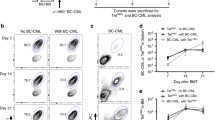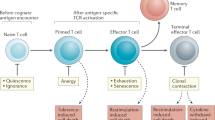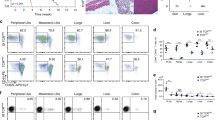Abstract
Peripheral T-cell tolerance is a mechanism to limit autoimmunity, but represents a major obstacle in diseases such as cancer. Tolerance is due to limited accumulation of antigen-specific T cells accompanied by functional hypo-responsiveness, and is induced by antigen encounter in a non-inflammatory environment. In contrast to advances in preventing induction of T-cell tolerance, there has been little progress in defining targets to reverse established tolerance. Here we show that signals from a single dose of an agonistic antibody against OX40 (CD134, a member of the tumor necrosis-factor family of receptors) can break an existing state of tolerance in the CD4+ T-cell compartment. OX40 signals promote T-cell expansion after the hypo-responsive phenotype is induced and restore normal functionality. These data highlight the potent costimulatory capacity of OX40, and indicate OX40 as a target for therapeutic intervention in a variety of related diseases.
This is a preview of subscription content, access via your institution
Access options
Subscribe to this journal
Receive 12 print issues and online access
$209.00 per year
only $17.42 per issue
Buy this article
- Purchase on Springer Link
- Instant access to full article PDF
Prices may be subject to local taxes which are calculated during checkout






Similar content being viewed by others
References
Dresser, D.W. & Mitchison, N.A. The mechanism of immunological paralysis. Adv. Immunol. 8, 129–181 (1968).
Bretscher, P. & Cohn, M. A theory of self-nonself discrimination. Science 169, 1042–1049 (1970).
Jenkins, M.K. & Schwartz, R.H. Antigen presentation by chemically modified splenocytes induces antigen-specific T cell unresponsiveness in vitro and in vivo. J. Exp. Med. 165, 302–319 (1987).
Schwartz, R.H. Acquisition of immunologic self-tolerance. Cell 57, 1073–1081 (1989).
DeSilva, D.R., Urdahl, K.B. & Jenkins, M.K. Clonal anergy is induced in vitro by T cell receptor occupancy in the absence of proliferation. J. Immunol. 147, 3261–3267 (1991).
Schwartz, R.H. T cell clonal anergy. Curr. Opin. Immunol. 9, 351–357 (1997).
Harding, F.A., McArthur, J.G., Gross, J.A., Raulet, D.H. & Allison, J.P. CD28-mediated signalling co-stimulates murine T cells and prevents induction of anergy in T-cell clones. Nature 356, 607–609 (1992).
Boussiotis, V.A., Freeman, G.J., Gray, G., Gribben, J. & Nadler, L.M. B7 but not intercellular adhesion molecule-1 costimulation prevents the induction of human alloantigen-specific tolerance. J. Exp. Med. 178, 1753–1763 (1993).
Perez, V.L. et al. Induction of peripheral T cell tolerance in vivo requires CTLA-4 engagement. Immunity 6, 411–417 (1997).
Chambers, C.A., Sullivan, T.J. & Allison, J.P. Lymphoproliferation in CTLA-4-deficient mice is mediated by costimulation-dependent activation of CD4+ T cells. Immunity 7, 885–895 (1997).
Sotomayor, E.M. et al. Conversion of tumor-specific CD4+ T-cell tolerance to T-cell priming through in vivo ligation of CD40. Nature Med. 5, 780–787 (1999).
Gramaglia, I., Weinberg, A.D., Lemon, M. & Croft, M. OX40 Ligand: A potent costimulatory molecule for sustaining primary CD4 T cell responses. J. Immunol. 161, 6510–6517 (1998).
Akiba, H. et al. CD28-independent costimulation of T cells by OX40 ligand and CD70 on activated B cells. J. Immunol. 162, 7058–7066 (1999).
Gramaglia, I. et al. The OX40 costimulatory receptor determines the development of CD4 memory by regulating primary clonal expansion. J. Immunol. 165, 3043–3050 (2000).
Calderhead, D.M. et al. Cloning of mouse Ox40: A T-cell activation marker that may mediate T-B cell interactions. J. Immunol. 151, 5261–5271 (1993).
Godfrey, W.R., Fagnoni, F.F., Harara, M.A., Buck, D. & Engleman, E.G. Identification of a human OX-40 ligand, a costimulator of CD4+ T cells with homology to tumor necrosis factor. J. Exp. Med. 180, 757–762 (1994).
Kopf, M. et al. OX40-deficient mice are defective in Th cell proliferation but are competent in generating B cell and CTL responses after virus infection. Immunity 11, 699–708 (1999).
Chen, A.I. et al. Ox40-ligand has a critical costimulatory role in dendritic cell:T cell interactions. Immunity 11, 689–698 (1999).
Murata, K. et al. Impairment of antigen-presenting cell function in mice lacking expression of OX40 ligand. J. Exp. Med. 191, 365–374 (2000).
Maxwell, J., Weinberg, A.D., Prell, R.A. & Vella, A.T. Danger and OX40 receptor signaling synergize to enhance memory T cell survival by inhibiting peripheral deletion. J. Immunol. 164, 107–112 (2000).
Croft, M., Joseph, S.B. & Miner, K.T. Partial activation of naive CD4 T cells and tolerance induction in response to peptide presented by resting B cells. J. Immunol. 159, 3257–3265 (1997).
Barnden, M.J., Allison, J., Heath, W.R. & Carbone, F.R. Defective TCR expression in transgenic mice constructed using cDNA- based α- and β-chain genes under the control of heterologous regulatory elements. Immunol. Cell. Biol. 76, 34–40. (1998).
Kearney, E.R., Pape, K.A., Loh, D.Y. & Jenkins, M.K. Visualization of peptide-specific T cell immunity and peripheral tolerance induction in vivo. Immunity 1, 327–339 (1994).
Al-Shamkhani, A. et al. OX40 is differentially expressed on activated rat and mouse T cells and is the sole receptor for the OX40 ligand. Eur. J. Immunol. 26, 1695–1699 (1996).
Schwartz, R.H. A cell culture model for T lymphocyte clonal anergy. Science 248, 1349–1356 (1990).
Jenkins, M.K., Chen, C.A., Jung, G., Mueller, D.L. & Schwartz, R.H. Inhibition of antigen-specific proliferation of type 1 murine T cell clones after stimulation with immobilized anti-CD3 monoclonal antibody. J. Immunol. 144, 16–22 (1990).
Ria, F., Chan, B.M., Scherer, M.T., Smith, J.A. & Gefter, M.L. Immunological activity of covalently linked T-cell epitopes. Nature 343, 381–383 (1990).
Romball, C.G. & Weigle, W.O. In vivo induction of tolerance in murine CD4+ cell subsets. J. Exp. Med. 178, 1637–1644 (1993).
Aichele, P., Brduscha-Riem, K., Zinkernagel, R.M., Hengartner, H. & Pircher, H. T cell priming versus T cell tolerance induced by synthetic peptides. J. Exp. Med. 182, 261–266 (1995).
Pape, K.A., Merica, R., Mondino, A., Khoruts, A. & Jenkins, M.K. Direct evidence that functionally impaired CD4+ T cells persist in vivo following induction of peripheral tolerance. J. Immunol. 160, 4719–4729 (1998).
Stuber, E., Neurath, M., Calderhead, D., Fell, H.P. & Strober, W. Cross-linking of OX40 ligand, a member of the TNF/NGF cytokine family, induces proliferation and differentiation in murine splenic B cells. Immunity 2, 507–521 (1995).
Weinberg, A.D. et al. Engagement of the OX-40 receptor in vivo enhances antitumor immunity. J. Immunol. 164, 2160–2169 (2000).
Garza, K.M. et al. Role of antigen-presenting cells in mediating tolerance and autoimmunity. J. Exp. Med. 191, 2021–2027 (2000).
Shrikant, P., Khoruts, A. & Mescher, M.F. CTLA-4 blockade reverses CD8+ T cell tolerance to tumor by a CD4+ T cell- and IL-2-dependent mechanism. Immunity 11, 483–493 (1999).
Hurwitz, A.A., Yu, T.F., Leach, D.R. & Allison, J.P. CTLA-4 blockade synergizes with tumor-derived granulocyte-macrophage colony-stimulating factor for treatment of an experimental mammary carcinoma. Proc. Natl. Acad. Sci. USA 95, 10067–10071 (1998).
Leach, D.R., Krummel, M.F. & Allison, J.P. Enhancement of antitumor immunity by CTLA-4 blockade. Science 271, 1734–1736 (1996).
Schwartz, R.H. Models of T cell anergy: is there a common molecular mechanism? J. Exp. Med. 184, 1–8 (1996).
Fields, P.E., Gajewski, T.F. & Fitch, F.W. Blocked Ras activation in anergic CD4+ T cells. Science 271, 1276–1278 (1996).
Li, W., Whaley, C.D., Mondino, A. & Mueller, D.L. Blocked signal transduction to the ERK and JNK protein kinases in anergic CD4+ T cells. Science 271, 1272–1276 (1996).
Kang, S.M. et al. Transactivation by AP-1 is a molecular target of T cell clonal anergy. Science 257, 1134–1138 (1992).
Sundstedt, A. et al. In vivo anergized CD4+ T cells express perturbed AP-1 and NF-κB transcription factors. Proc. Natl. Acad. Sci. USA 93, 979–984 (1996).
Boussiotis, V.A. et al. p27kip1 functions as an anergy factor inhibiting interleukin 2 transcription and clonal expansion of alloreactive human and mouse helper T lymphocytes. Nature Med 6, 290–297 (2000).
Arch, R.H. & Thompson, C.B. 4-1BB and Ox40 are members of a tumor necrosis factor (TNF)-nerve growth factor receptor subfamily that bind TNF receptor-associated factors and activate nuclear factor κB. Mol. Cell. Biol. 18, 558–565 (1998).
Kawamata, S., Hori, T., Imura, A., Takaori-Kondo, A. & Uchiyama, T. Activation of OX40 signal transduction pathways leads to tumor necrosis factor receptor-associated factor (TRAF) 2- and TRAF5-mediated NF-κB activation. J. Biol. Chem. 273, 5808–5814 (1998).
Acknowledgements
This work was supported by grants to M.C. from the NIH (AI42944) and the Concern Foundation.
Author information
Authors and Affiliations
Corresponding author
Rights and permissions
About this article
Cite this article
Bansal-Pakala, P., Gebre-Hiwot Jember, A. & Croft, M. Signaling through OX40 (CD134) breaks peripheral T-cell tolerance. Nat Med 7, 907–912 (2001). https://doi.org/10.1038/90942
Received:
Accepted:
Issue Date:
DOI: https://doi.org/10.1038/90942
This article is cited by
-
OX40 in the Pathogenesis of Atopic Dermatitis—A New Therapeutic Target
American Journal of Clinical Dermatology (2024)
-
Current Clinical Trial Landscape of OX40 Agonists
Current Oncology Reports (2022)
-
Genetic and molecular biology of systemic lupus erythematosus among Iranian patients: an overview
Autoimmunity Highlights (2021)
-
Agonist redirected checkpoint, PD1-Fc-OX40L, for cancer immunotherapy
Journal for ImmunoTherapy of Cancer (2018)
-
OX40, OX40L and Autoimmunity: a Comprehensive Review
Clinical Reviews in Allergy & Immunology (2016)



